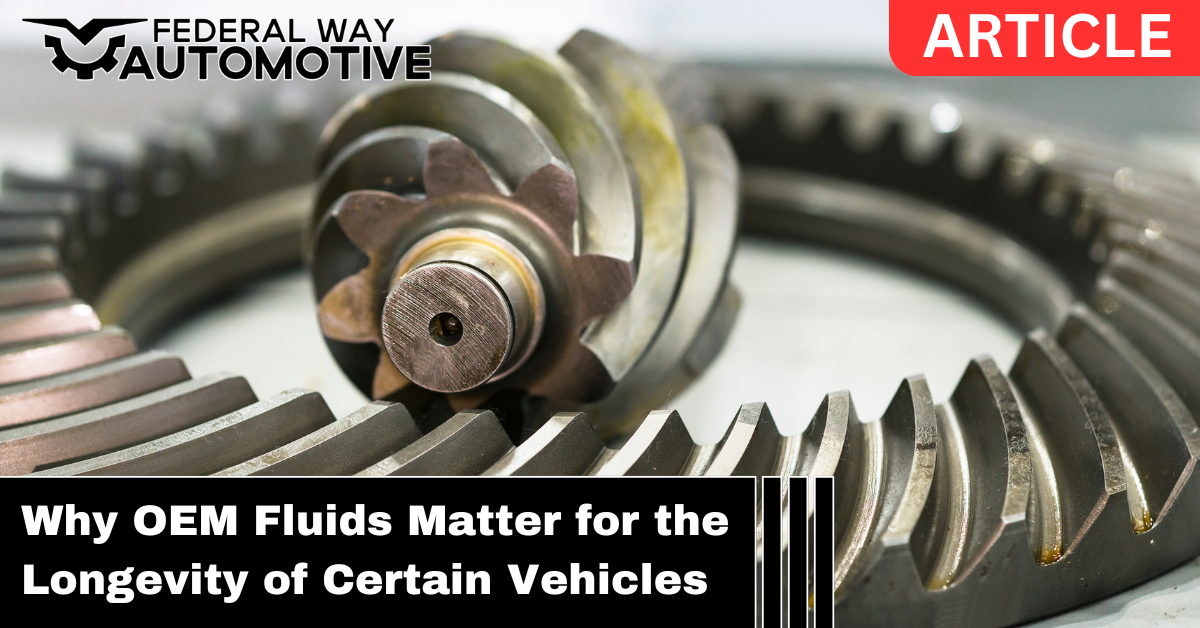When it comes to vehicle maintenance, it’s easy to think that all fluids are basically the same. Transmission fluid is transmission fluid… right?
Not exactly.
For many modern vehicles, using the wrong fluid — even a name-brand aftermarket one — can cause serious problems. In some cases, only OEM fluids (Original Equipment Manufacturer) are engineered with the exact chemical makeup and additive package required for proper operation and longevity.
At Federal Way Automotive, we’ve helped countless customers avoid costly damage by using the right fluids for each system. In this article, we’ll break down why it matters, where it matters most, and what can go wrong if OEM specs aren’t followed.
What Makes One Fluid Different from Another?
Most fluids — like transmission fluid, differential fluid, transfer case fluid, and CVT fluid — may look similar, but they’re each formulated for specific tasks. And within those categories, different manufacturers have unique requirements for viscosity, detergents, friction modifiers, and anti-wear additives.
OEM fluids are designed to meet those exact needs. Aftermarket “universal” fluids might cover some specifications, but they don’t always include the full additive profile your vehicle relies on for smooth and safe operation.
When Using the Wrong Fluid Can Cause Real Problems
1. Honda CR-V Rear Differential Fluid
Let’s start with a real-world example: the rear differential in many Honda CR-Vs. These AWD systems are incredibly sensitive to fluid type.
Using anything other than Honda Dual Pump Fluid II often results in:
- Groaning or binding noises during turns
- Chatter or vibration at low speeds
- Premature wear of internal clutches
We’ve seen it firsthand. Customers come in with rear-end noise after a quick lube shop used generic gear oil. A simple switch back to Honda’s OEM fluid almost always resolves it — but damage can be permanent if left too long.
2. CVT Transmissions
Continuously Variable Transmissions (CVTs) are extremely fluid-sensitive. Each automaker — whether it’s Nissan, Subaru, Honda, or Toyota — uses a very specific CVT fluid blend.
Generic CVT fluids don’t always provide the right:
- Friction properties
- Heat tolerance
- Shear stability
Using the wrong fluid can cause belt slippage, overheating, and eventual CVT failure, which can cost thousands to replace. That’s why we always use the manufacturer-specified CVT fluid when servicing any CVT-equipped vehicle.
3. Transfer Case and Differential Fluids
Many modern AWD and 4WD systems rely on limited-slip differentials, electronically controlled clutches, or viscous couplings. These systems are sensitive to both viscosity and friction modifiers.
If you use the wrong fluid, you may experience:
- Clicking or binding during turns
- Delayed AWD engagement
- Damaged internal clutch packs
Once again, the additive package matters more than the label. The right OEM fluid ensures proper lubrication under load, especially in systems that don’t operate all the time but need to work instantly when traction is lost.
4. Automatic Transmission Fluid (ATF)
Even traditional automatic transmissions can suffer from the wrong fluid. Each manufacturer uses slightly different:
- Detergents
- Friction modifiers
- Flow characteristics when cold or hot
This affects shift feel, timing, and clutch wear. Installing a universal ATF in a vehicle that requires a specific blend (like Toyota WS or Honda DW-1) can lead to harsh shifting or long-term internal damage.
Why Additives Make All the Difference
OEM fluids include additive packages engineered for the exact design and function of the system. These can include:
- Anti-foaming agents
- Corrosion inhibitors
- Friction modifiers
- Temperature stabilizers
- Detergents and dispersants
Using a fluid without the correct blend can result in anything from poor performance to shortened lifespan of components.
How We Handle Fluids at Federal Way Automotive
At Federal Way Automotive, we don’t take chances with your vehicle. When it comes to fluid services — whether it’s a transmission flush, differential service, or routine maintenance — we always:
- Check the manufacturer specifications for your exact year, make, and model
- Use OEM or OEM-approved fluids that meet or exceed those standards
- Document and label each service for future reference
- Avoid universal or one-size-fits-all fluids unless specifically approved by the automaker
This is one of the most important — and most overlooked — aspects of professional auto repair.
Protect Your Investment with the Right Fluids
It’s easy to overlook fluid choices when all you see is a color on a dipstick. But using the right fluids — with the correct additives, viscosity, and compatibility — can be the difference between long-term reliability and early component failure.
Whether you’re coming in for a routine oil change, a transmission service, or addressing a specific issue, we’ll make sure your car gets exactly what it needs to stay reliable.
Schedule Your Next Fluid Service at Federal Way Automotive
If you’re due for a fluid service, or unsure what was used at your last shop visit, we’re here to help. We’ll verify specs, check fluid condition, and help you protect your transmission, differential, and drivetrain the right way.
Call us today or schedule your appointment online. At Federal Way Automotive, we do it right — down to the last drop.


